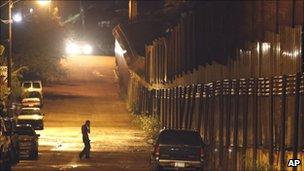Q&A: Arizona immigration law
- Published

As a border state, immigration is a big issue in Arizona
Arizona's new immigration law has been criticised within the US and across the border in Mexico, and now a judge has blocked parts of it.
Its defenders say it is a legitimate attempt to deal with the problem of illegal immigration, but what is in the controversial legislation and what has been stopped by the court?
Has the law been thrown out?
No. The judge in Phoenix, Susan Bolton, said she would not block the law in its entirety, as some parties in the case had asked.
Who brought the case?
Lawyers from the Department of Justice said the government of Arizona had exceeded its powers, as immigration is an issue for the federal government.
Other groups also challenged the law.
What will happen next?
The Arizona government says it will appeal, and a long legal battle could lie ahead before the issues are finally resolved.
The first step is going to the 9th Circuit Court of Appeals in San Francisco to ask for the preliminary injunction to be lifted.
But commentators are already suggesting that the case could eventually go all the way to the Supreme Court.
Why was the original law passed?
SB1070, as it is formally known, says in its preamble that there is "compelling interest in the co-operative enforcement of federal immigration laws throughout all of Arizona". It aims to "discourage and deter" the presence of illegal immigrants.
Why has it caused protests?
Critics have been outspoken in their attacks on the law. President Barack Obama has criticised it, as have his Mexican counterpart Felipe Calderon, a group of nine police chiefs and civil rights groups.
Activists say the law as written would have led to the harassment of legal immigrants from ethnic minorities.
Would the original law have allowed suspected illegal immigrants to be stopped in the street?
No. The law would only have allowed a person to be questioned about their immigration status where they were already in contact with a law enforcement official, for instance if they had been stopped for a suspected offence, or arrested.
It then says "where reasonable suspicion exists that the person is an alien who is unlawfully present in the United States, a reasonable attempt shall be made, when practicable, to determine the immigration status of the person".
This was one of the sections blocked by the judge.
What would suspected illegal immigrants have had to do?
Providing an Arizona driving licence, state ID, tribal ID or other form of ID that requires proof of legal presence in the US would have been enough if the law had come into force as written.
Does the act allow racial profiling?
Defenders of the act say it specifically forbids the targeting of people from ethnic minorities.
The text says "a law enforcement official or agency of this state or a county, city, town or other political subdivision of this state may not solely consider race, colour or national origin in implementing the requirements of this subsection except to the extent permitted by the United States or Arizona constitution".
But critics are not convinced that these criteria will not be used by law enforcement officials.
What other parts of the bill were blocked?
The judge said "that the United States is likely to succeed on the merits in showing that the following sections of SB1070 are pre-empted by federal law".
She then listed the section requiring law enforcement officers to determine immigration status and the new offence of "wilful failure to complete or carry an alien registration document".
The judge also blocked the section "creating a crime for an unauthorised alien to solicit, apply for, or perform work" and the part "authorizing the warrantless arrest of a person where there is probable cause to believe the person has committed a public offense that makes the person removable from the United States".
Were any parts of the bill not blocked?
Much of the bill was not subject to an injunction, including a part aimed at stopping vehicles blocking the road while picking up casual labourers.
What do the defenders say?
Arizona Governor Jan Brewer and other supporters in the state say the law does not attempt to supersede or replace federal law.
Instead they say the act merely requires the enforcement of already existing federal laws.
A central point of the law is that it means that law enforcement bodies in Arizona cannot ignore immigration laws.
- Published16 July 2010
- Published7 July 2010
- Published23 June 2010
- Published22 June 2010